外研社必修一module2
- 格式:docx
- 大小:24.25 KB
- 文档页数:3

外研版必修1 Module 21.beamused to do sth. 做某事感到好笑beamusedat对某事感到好笑to one’samusement 令某人感到好笑的是2.bepatient with对……有耐心be patientof 忍受……be outofpatience with无法忍受……have nopatiencewith无法忍受……3.bestrict in sth.对某事要求严格be strictwithsb. 对某事要求严格4.beenthusiastic about 对……充满热情5.to one’s amazement= to one’s suprise令某人感到惊讶的是be amazeda t= besurprised at 对……感到惊讶6.somethinglike 大约,有点儿(像)(用于肯定句) anything like大约,有点儿(像)(用于疑问句或否定句)nothing like完全不像,根本不像7.nothing but只不过anything but绝对不8.introduce …to …把……介绍给……9.be embarrassedat/with对……感到尴尬beembarrassed to dosth. 尴尬地做某事toone’s embarrassment令某人感到尴尬的是10.instruct sb. todo sth. 命令某人做某事under one’s instruction 在某人的指示(命令)下11.by oneself 单独,独自12.look forwardto doingsth. 期待做某事13.make fun of 取笑/捉弄某人14.encourage sb.todo sth.鼓励某人做某事discourage sb. fromdoingsth.阻止某事做某事15.bedisappointed with/in对……感到失望be disappointedat/by/about 因……而失望toone’sdisappointment令……感到失望的是16.be boredwith 对……感到厌烦17.make (great) progress in在……取得(巨大)进步be in progress正处于进步中18.mind doing sth. 介意做某事常见句型:Would you minddoing ……Do youminddoing ……19.bedivided into 被分为……。
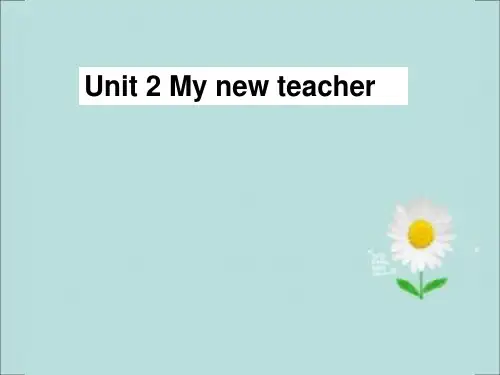
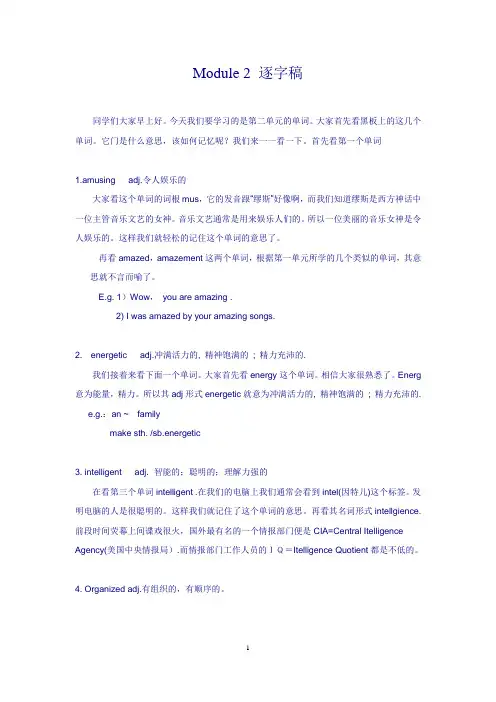
Module 2 逐字稿同学们大家早上好。
今天我们要学习的是第二单元的单词。
大家首先看黑板上的这几个单词。
它门是什么意思,该如何记忆呢?我们来一一看一下。
首先看第一个单词1.amusing adj.令人娱乐的大家看这个单词的词根mus,它的发音跟“缪斯”好像啊,而我们知道缪斯是西方神话中一位主管音乐文艺的女神。
音乐文艺通常是用来娱乐人们的。
所以一位美丽的音乐女神是令人娱乐的。
这样我们就轻松的记住这个单词的意思了。
再看amazed,amazement这两个单词,根据第一单元所学的几个类似的单词,其意思就不言而喻了。
E.g. 1)Wow,you are amazing .2) I was amazed by your amazing songs.2. energetic adj.冲满活力的, 精神饱满的; 精力充沛的.我们接着来看下面一个单词。
大家首先看energy这个单词。
相信大家很熟悉了。
Energ 意为能量,精力。
所以其adj形式energetic就意为冲满活力的, 精神饱满的; 精力充沛的.e.g.:an ~ familymake sth. /sb.energetic3. intelligent adj.智能的;聪明的;理解力强的在看第三个单词intelligent .在我们的电脑上我们通常会看到intel(因特儿)这个标签。
发明电脑的人是很聪明的。
这样我们就记住了这个单词的意思。
再看其名词形式intellgience.前段时间荧幕上间谍戏很火,国外最有名的一个情报部门便是CIA=Central Itelligence Agency(美国中央情报局).而情报部门工作人员的IQ=Itelligence Quotient都是不低的。
4. Organized adj.有组织的,有顺序的。
再看第四个单词。
首先看这个单词的前半部分organ.我们知道organ的意思是器官。
人体的器官是有组织有顺序的。
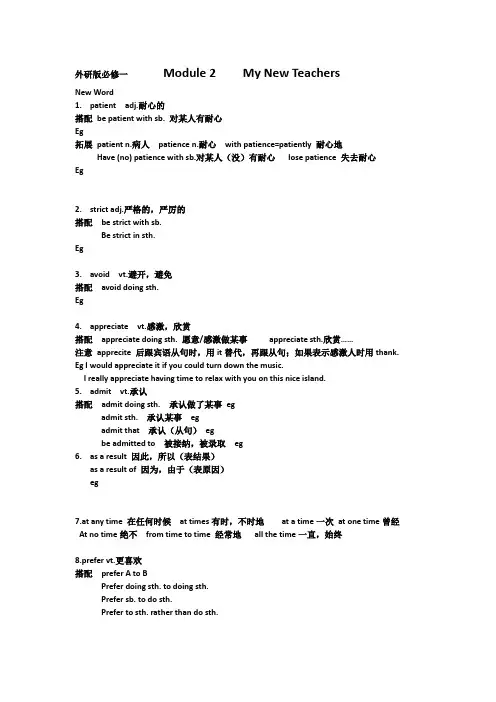
外研版必修一Module 2 My New TeachersNew Word1.patient adj.耐心的搭配be patient with sb. 对某人有耐心Eg拓展patient n.病人patience n.耐心with patience=patiently 耐心地Have (no) patience with sb.对某人(没)有耐心lose patience 失去耐心Eg2.strict adj.严格的,严厉的搭配be strict with sb.Be strict in sth.Eg3.avoid vt.避开,避免搭配avoid doing sth.Eg4.appreciate vt.感激,欣赏搭配appreciate doing sth. 愿意/感激做某事appreciate sth.欣赏……注意apprecite 后跟宾语从句时,用it替代,再跟从句;如果表示感激人时用thank. Eg I would appreciate it if you could turn down the music.I really appreciate having time to relax with you on this nice island.5.admit vt.承认搭配admit doing sth. 承认做了某事egadmit sth. 承认某事egadmit that 承认(从句)egbe admitted to 被接纳,被录取eg6.as a result 因此,所以(表结果)as a result of 因为,由于(表原因)eg7.at any time 在任何时候at times有时,不时地at a time一次at one time曾经At no time绝不from time to time 经常地all the time一直,始终8.prefer vt.更喜欢搭配prefer A to BPrefer doing sth. to doing sth.Prefer sb. to do sth.Prefer to sth. rather than do sth.9.would rather 宁愿….搭配would rather do sth.would rather do than dowould rather+从句10.be up to sb.由某人说了算拓展up to 达到,多达,胜任up to now到目前为止be up to do正在做,从事于11.be true of(某种情况)适用于,适宜于Eg The food in this restaurant is good and is true of the service.12.consider vt.认为,考虑搭配consider sb.(as)+n.(to be)+adj. 把…当作/看作,认为某人….consider sb.to do 认为某人做某事consider that(从句)认为…..consider doing sth.考虑做某事13.pay for付款拓展pay back 偿还pay off 偿清,有回报pay a visit to 参观pay attention to 注意Sentences1….but I think that I’ll do well in the exam with Mr chen teaching me. With+宾语+宾补通常表示原因,伴随或方式。
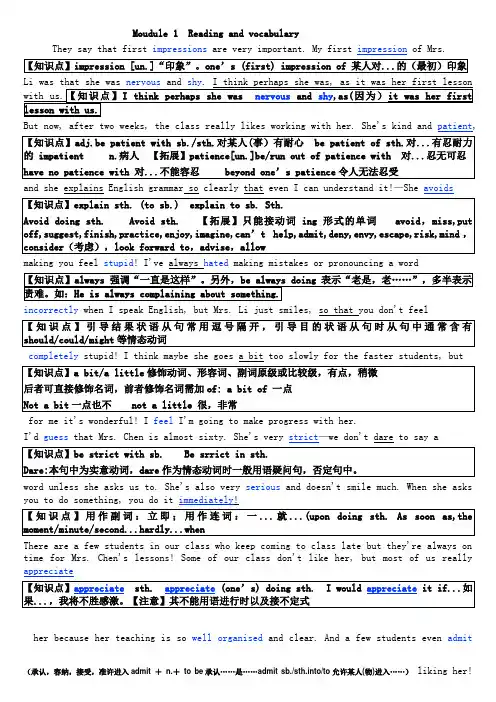
Moudule 1 Reading and vocabularyThey say that first impressions are very important. My first impression of Mrs.But now, after two weeks, the class really likes working with her. She's kind and patient,and she explains English grammar so clearly that even I can understand it!—She avoidsmaking you feel stupid! I've always hated making mistakes or pronouncing a wordincorrectly when I speak English, but Mrs. Li just smiles, so that you don't feelcompletely stupid! I think maybe she goes a bit too slowly for the faster students, butfor me it's wonderful! I feel I'm going to make progress with her.I'd guess that Mrs. Chen is almost sixty. She's very strict—we don't dare to say aword unless she asks us to. She's also very serious and doesn't smile much. When she asks you to do something, you do it immediately!There are a few students in our class who keep coming to class late but they're always on time for Mrs. Chen's lessons! Some of our class don't like her, but most of us really appreciateher because her teaching is so well organised and clear. And a few students even admit(承认,容纳,接受,准许进入admit +n.+to be承认……是……admit sb./sth.into/to允许某人(物)进入……)liking her!During scientific experiments, she explains exactly what is happening and as a result my work is improving. Physics will never be myMr. Wu's only been teaching us for two weeks and he's already very popular. I think this is because he really enjoys teaching Chinese literature—he loves it, in fact! He's got so much energy; this is one class you do not fall asleep in! He's about 28, I think, and is rather good-looking. He talks loudly and fast, and waves his hands about a lot when he gets excited. He's really amusing and tells jokes when he thinks we're getting bored. Even things like compositions and summaries are fun with Mr. Wu. I respect him a lot.2.He has____________(承认)that he did not finish his homework.3.He is____________(欣赏)by his boss because he has done his work well.4.After learning some passages,the teacher asked us to write two____________(总结).5.My beloved mother is always____________(精力充沛的)as though she never knows tiredness.6.Tom is a very____________(聪明的)boy.He often finds the solutions to some difficult problems.Ⅱ.选词填空summary;respect;appreciate;avoid;serious1.At the end of the news,they often give you a ____________ of the main news stories.2.I’d ____________ it if you let me get on with my job.3.Do you think Tim’s ____________ me?I haven’t seen him all day.4.Please don’t laugh—I’m being ____________.5.New teachers have to win the ____________ of their students.Ⅲ.单项填空1.Just be a little________.Soon you will find out what you want to know.A.serious B.Strict C.nervous D.patient2.Her parents put a lot of effort into getting her________to a key school.A.accepted B.Received C.announced D.admitted3.They told me it would be cheap but________it cost me nearly $500.A.in a word B.at last C.in fact D.as a result4.I have much respect ________teachers because they devote themselves to teaching.A.to B.For C.about D.towards5.Reading is________good habit.Stick to it,and you’ll make________great progress.A.a;/ B.a;a C.the;a D./;a6.With some books badly needed________,she hurried to the bookstore.A.buying B.Bought C.to buy D.buy7.I won’t call you,________something unexpected happens.A.unless B.Whether C.because D.while8.People appreciate________with him because he is knowledgeable and humorous.A.to talk B.Shouting C.to shout D.talking9.—Did you pack him some food?—Yes,________he wouldn’t get hungry.A.as soon as B.as a result C.so that D.in case10.He is a(n)________man.He can work more than 10 hours without rest.A.energetic B.Powerful C.lovely D.intelligentⅣ.阅读理解I arrived in the classroom,ready to share my knowledge and experience with 76 students who would be my English literature class.Having taught in the US for 17 years,I have no doubt about my ability to hold their attention and to impress on them my admiration for the literature of my mother tongue.I was shocked when the monitor shouted,“stand up!” The entire class rose as I entered the room and I was somewhat confused about how to get them to sit down again,but once the embarrassment was over,I quickly regained my calmness and admiration.I went back to my office with the rosy glow which came from a strong sense of achievement.My students kept diaries.However,as I read them,the rosy glow was gradually replaced by a strong sense of sadness.The first diary said,“Our literature teacher didn’t teach us anything today.Perhaps her next lecture will be better.”Greatly surprised,I read diary after diary,each expressing a similar theme.“Didn’t I teach them anything? I described the entire Western philosophy(哲学)and laid the historical background for all the works we will study in class,”I complained.“How should they say I didn’t teach them anything?”It was a long term,and it gradually became clear that my ideas about education were not the same as those of my students.I thought a teacher’s job was to raise in teresting questions and provide enough background so that students could draw their own conclusions.My students thought a teacher’s job was to provide exact information as directly and clearly as possible.What a difference!However,I also learned a lot, and the experience with my Chinese students has made me a better American teacher,knowing how to teach in a different culture.1.The writer wants to tell us through her experience that ________.A.Chinese students are hard to teach B.she has no-experience in teaching Chinese studentsC.Chinese students has made her a better American teacherD.different countries have different cultures even in teaching2.We can know that on the first day the writer ________.A.was disappointed at her students’ performan ce B.felt very confident about herself at firstC.felt she didn’t teach them much D.was very confident about her students3.At the beginning of the lesson,the writer got confused because of ________.A.cultural differences B.her own embarrassment C.students’ embarrassment D.students’ admiration 4.The writer learnt from their diaries that the students wanted to ________.A.raise interesting questions B.know more about backgroundC.draw their own conclusions D.know more about exact facts5.We can infer from the passage that ________.A.the writer doubted about her ability of teaching B.the writer is still teaching Western philosophy in China C.different cultures may require different teaching methodsD.the write r’s experience has made her return to her own countryⅤ.阅读表达What does work to get you around unfamiliar territory(不熟悉的地方)is a map.To use a map,you must be able to read it.If you want to use a map,here’s what you should do:First,find out which is north,south,east,and west.Next,look for the special signs and symbols(标志物) on themap.This_means_you_must_find_out_what_things_stand_for_other_things.For example,a red line usually stands for a main highway or freeway.A black line stands for a street,and a black line with little lines across it stands for a railroad.A blue line usually stands for a river.The size of cities is indicated(表示)by the size of a black dot.An airport is shown by a tiny plane.All this information explaining what the lines and s hapes stand for is given in the “legend”.It is called the legend because it tells the story of the map.The legend is usually found at the bottom of the map.Then,of course,in order to find your way,you must know where you are first.Mark this place on the map.Then,find the place on the map where you want to go and mark it.Now you can read the map to see what seems the best way to get to your destination(目的地).1.What is the main idea of the passage?(no more than 10 words)________________________________________________________________________2.What must you know before you can read a map?(no more than 10 words)________________________________________________________________________3.What is the legend in this passage?(no more than 10 words)________________________________________________________________________4.What stands for a railroad on a map?(no more than 10 words)________________________________________________________________________5.Translate the underlined sentence in the third paragraph into Chinese.________________________________________________________________________Moudule 2 Listening and vocabulary1.The soldiers showed perfect____________(纪律)under fire.2.I will be____________(轻松的)when I know you are safe.3.She was late and I____________(同样地)was delayed.4.The job does not require any____________(正式的)training.5.What is the____________(关系)between the man and the woman?6.Students sometimes take jobs during the ____________(假期).Ⅱ.选词填空be true of;take notes;come true;point at;would rather1.His dream of becoming a star ____________.2.It’s impolite of you to face people with your feet ____________them.3.The food is good and the same ____________ the service.4.The students are busy ____________ in class.5.I can come today but I ____________ come tomorrow.Ⅲ.单项填空1.—Shall we go to the exhibition in the museum this Sunday?—________.A.It’s up to you B.It’s by you C.It’s your turn D.It goes to you2.Our bodies are strengthened by taking exercise.________,our minds are developed by learning.A.Probably B.LikelyC.Similarly D.Generally3.Charles Babbage is generally considered________the first computer.A.to invent B.inventingC.to have invented D.having invented4.—Have you got any particular plans for the coming holiday?—Yes.________,I’m going to visit some homes for the old in the city.A.If ever B.If busyC.If anything D.If possible5.I wish you’d do ________ talking and some more work.Thus things will become better.A.a bit less B.any lessC.much more D.a little more6.I cannot go shopping with you because I have________things to do.A.a couple of B.the couple ofC.couples of D.a couple7.I thought her nice and honest ________ I met her.A.first time B.the first timeC.for the first time D.in time8.We will be shown around the city:schools,museums,and some other places,________ other visitors seldom go.A.what B.whichC.where D.when9.________either he or you going with me when the play________here?A.Is;is put on B.Is;is put upC.Are;is put on D.Are;put up10.—Do you mind if I open the windows?—________ I feel a bit cold.A.Of course not. B.I’d rather you didn’t.C.Go ahead. D.Why not?Ⅳ.完形填空While I studied at school,I had great difficulty in learning my Latin translations.I was always very__1__in using a dictionary,and__2__it most difficult,while to other boys it seemed no__3__.I formed an alliance(盟友)with a boy in the Sixth Grade.He was very clever and__4__read Latin as easily as English.My friend for his part was almost as__5__troubled by the English essays he had to write for the headmaster as I was__6__these Latin words.We agreed together that he could__7__me my Latin translations and1.A.quick B.slowC.hard D.good2.A.made B.gotC.found D.left3.A.trouble B.differenceC.labor D.worry4.A.might B.wouldC.should D.could5.A.very B.littleC.much D.few6.A.for B.byC.in D.to7.A.change B.takeC.forgive D.tellthat I should do his essays.The arrangement__8__wonderfully.The headmaster seemed quite__9__with my work,and I had more time to myself in the morning.On the other hand,once a week__10__I had to write the essays of my friend.For several months no difficulty__11__,but once we were nearly caught out.One afternoon,the headmaster__12__my frie nd to discuss one essay with him in a lively spirit.“I was interested in this__13__you make here.I think you might have gone further.Tell me__14__you had in your mind.”The headmaster continued in this__15__for some time to the fear of my friend.However,the headmaster,not wishing to__16__an occasion of praise into__17__of fault-finding,finally__18__him go.He came back to me like a man who had had a very narrow__19__and I made up my mind to make every effort to study my__20__.8.A.worked B.triedC.happened D.developed9.A.angry B.satisfiedC.frightened D.sad10.A.or so B.or elseC.as usual D.as far11.A.became B.seemedC.lay D.appeared12.A.called B.taughtC.arranged D.sent13.A.aim B.goalC.point D.opinion14.A.why B.howC.which D.what15.A.excitement B.wayC.meaning D.disappointment16.A.turn B.leaveC.grow D.become17.A.none B.oneC.either D.some18.A.ordered B.askedC.took D.let19.A.surprise B.escapeC.hope D.chance20.A.reading B.writingC.translations D.essaysⅤ.阅读理解Many years ago,when I was fresh out of school and working in Denver,I was driving to my parents’ home in Missouri for Christmas.I stopped at a gas station(加油站) about 50 miles from Oklahoma City,where I was planning to stop and visit a friend.While I was standing in line at the cash register(收款台),I said hello to an older couple who were also paying for gas.I took_off,but had gone only a few miles when black smoke poured from the back of my car.I stopped and wondered what I should do.A car pulled up behind me.It was the couple I had spoken to at the gas station.They said they would take me to my friend’s.We chatted on the way into the city,and when I got out of the car,the husband gave me his business card.I wrote him and his wife a thank-you note for helping me.Soon afterward,I received a Christmas present from them.Their note that came with it said that helping me had made their holidays meaningful.Years later,I drove to a meeting in a nearby town in the morning.In late afternoon I returned to my car and found that I’d left the lights on all day,and the battery(电池)was dead.Then I noticed that the Friendly Ford dealership—a shop selling cars—was right next door.I walked over and found two salesmen in the showroom.“Just how friendly is Friendly Ford?” I asked and explained my trouble.They quickly drove a pickup truck to my car and started it.They would accept no payment,so when I got home,I wrote them a note to say thanks.I received a letter back from one of the salesmen.No one had ever taken the time to write him and say thank you,and it meant a lot,he said.“Thank you ”—two powerful words.They’re easy to say and mean so much.1.The author planned to stop at Oklahoma City to ________.A.visit a friendB.see his parentsC.pay for the cash registerD.have more gas for his car2.The word s “took off” underlined in Paragraph 2 mean“________”.A.turned off B.moved offC.put up D.set up3.What happened when the author found smoke coming out of his car?A.He had it pulled back to the gas station.B.The couple sent him a business card.C.The couple offered to help him.D.He called his friend for help.4.The battery of the author’s car was dead because ______.A.something went wrong with the lightsB.the meeting lasted a whole dayC.he forgot to turn off the lightsD.he drove too long a distance5.By telling his own experiences,the author tries to show ________.A.how to write a thank-you letterB.how to deal with car problemsC.the kind-heartedness of older peopleD.the importance of expressing thanks。
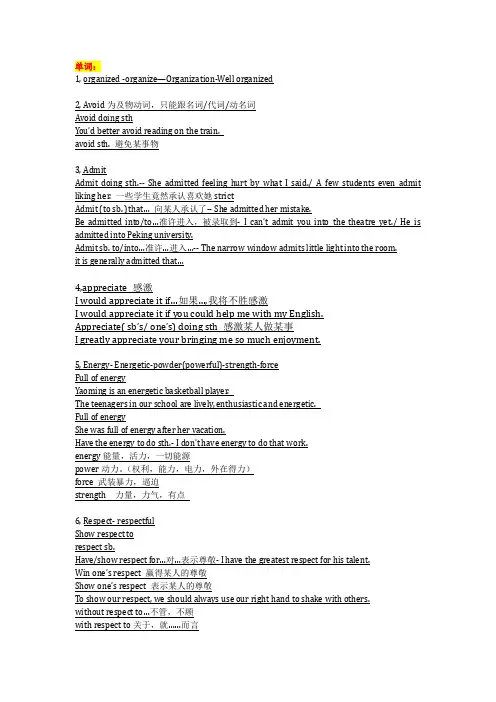
单词:1, organized -organize—Organization-Well organized2, Avoid为及物动词,只能跟名词/代词/动名词Avoid doing sthYou’d better avoid reading on the train.avoid sth. 避免某事物3, AdmitAdmit doing sth.--She admitted feeling hurt by what I said./ A few students even admit liking her. 一些学生竟然承认喜欢她strictAdmit (to sb. )that… 向某人承认了-- She admitted her mistake.Be admitted into/to…准许进入,被录取到-I can’t admit you into the theatre yet./ He is admitted into Peking university.Admit sb. to/into…准许…进入…-- The narrow window admits little light into the room.it is generally admitted that…4,appreciate 感激I would appreciate it if…如果…,我将不胜感激I would appreciate it if you could help me with my English.Appreciate( sb’s/ one’s) doing sth 感激某人做某事I greatly appreciate your bringing me so much enjoyment.5, Energy- Energetic-powder(powerful)-strength-forceFull of energyYaoming is an energetic basketball player.The teenagers in our school are lively, enthusiastic and energetic.Full of energyShe was full of energy after her vacation.Have the energy to do sth.- I don’t have energy to do that work.energy能量,活力,一切能源power动力。
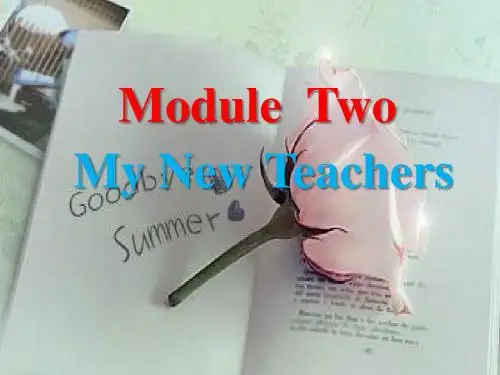
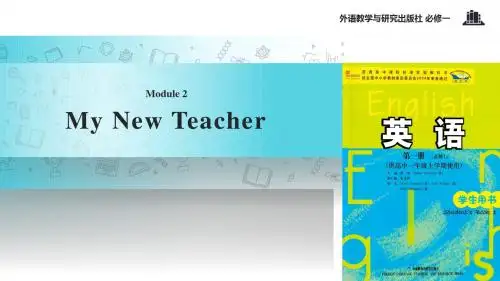
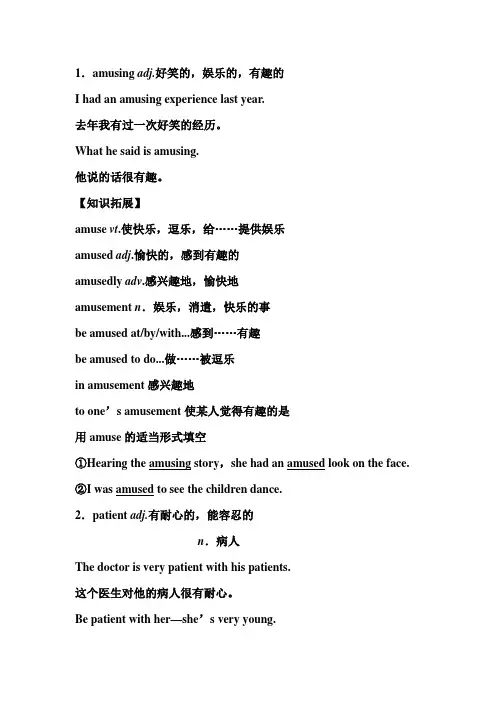
1.amusing adj.好笑的,娱乐的,有趣的I had an amusing experience last year.去年我有过一次好笑的经历。
What he said is amusing.他说的话很有趣。
【知识拓展】amuse vt.使快乐,逗乐,给……提供娱乐amused adj.愉快的,感到有趣的amusedly adv.感兴趣地,愉快地amusement n.娱乐,消遣,快乐的事be amused at/by/with...感到……有趣be amused to do...做……被逗乐in amusement感兴趣地to one’s amusement使某人觉得有趣的是用amuse的适当形式填空①Hearing the amusing story,she had an amused look on the face.②I was amused to see the children dance.2.patient adj.有耐心的,能容忍的n.病人The doctor is very patient with his patients.这个医生对他的病人很有耐心。
Be patient with her—she’s very young.对她耐心点——她年纪太小。
[剑桥高阶]【归纳拓展】(1)impatient adj.没有耐心的;不能容忍的be patient with sb.对某人有耐心be patient of sth.忍耐某事(2)patience n.忍耐力;耐心be out of patience with...对……忍无可忍have no patience with...对……不能容忍with patience=patiently耐心地⑨—What is he like?—He is patient ________ others and ________ hardships. A.with;of B.with;to C.of;with D.to;with解析:be patient with sb.“对某人有耐心”;be patient of sth.“忍耐某事”。
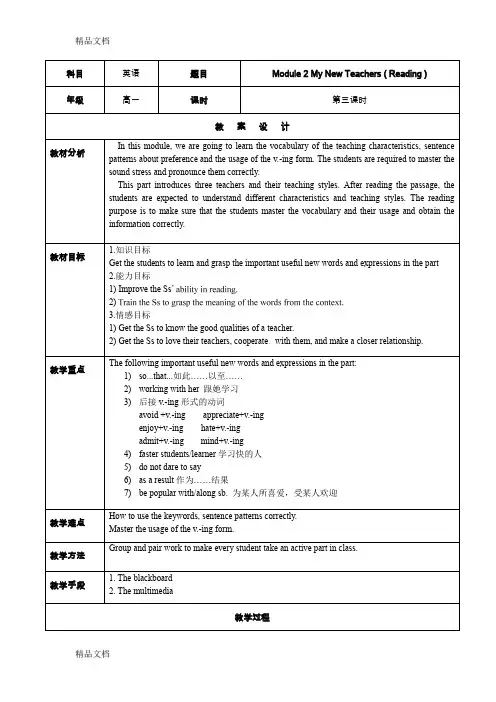
In this module, we are going to learn the vocabulary of the teaching characteristics, sentence patterns about preference and the usage of the v.-ing form. The students are required to master the sound stress and pronounce them correctly.This part introduces three teachers and their teaching styles. After reading the passage, the students are expected to understand different characteristics and teaching styles. The reading purpose is to make sure that the students master the vocabulary and their usage and obtain the information correctly.1.知识目标Get the students to learn and grasp the important useful new words and expressions in the part 2.能力目标1) Improve the Ss’2)3.情感目标1) Get the Ss to know the good qualities of a teacher.2) Get the Ss to love their teachers, cooperate with them, and make a closer relationship.The following important useful new words and expressions in the part:1. Greet the whole class as usual.2. Require Ss to read the text silently and quickly to get the general idea.3.4.Ask Ss a few questions on the screenand check their answers. Questions:1) Which teachers do the students like a lot?2) Who is a very good teacher but is serious and strict?Answers:1) Mrs. Li, Mr.2) Mrs. Chen.Module 2My New TeachersReading1)so...that...如此……以至……2)working with her 跟她学习3)后接v.-ing形式的动词avoid +v.-ing appreciate+v.-ingenjoy+v.-ing hate+v.-ingadmit+v.-ing mind+v.-ing4)faster students/learner学习快的人5)do not dare to say6)as a result作为……结果7)be popular with/along sb. 为某人所喜爱,受某人欢迎。
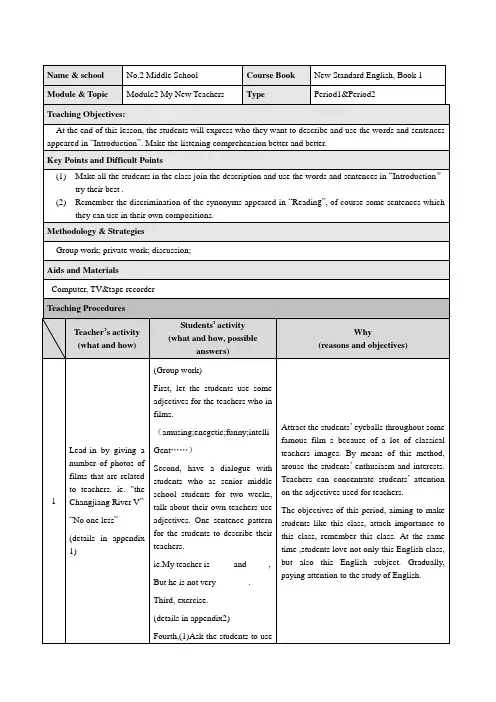
Moudule 1 Reading and vocabularyThey say that first impressions are very important. My first impression of Mrs.【知点】 impression [un.] “印象”。
one’ s (first) impression of 某人 ... 的(最先)印象Li was that she was nervous and shy. I think perhaps she was, as it was her first lessonwith us. 【知点】 I think perhaps she wasnervous and shy,as( 因) it was her first lesson with us.But now, after two weeks, the class really likes working with her. She's kind and patient ,【知点】 adj.be patient with sb./sth. 某人 ( 事)有耐心 be patient of sth. ... 有忍耐力的 impatient n. 病人【拓展】 patience[un.]be/run out of patience with ... 深恶痛绝have no patience with ... 不可以容忍beyond one ’s patience 令人没法忍耐and she explains English grammar so clearly that even I can understand it! —She avoids 【知点】 explain sth. (to sb.) explain to sb. Sth.Avoid doing sth. Avoid sth. 【拓展】只好接ing 形式的avoid , miss,put off,suggest,finish,practice,enjoy,imagine,can ’ t help,admit,deny,envy,escape,risk,mind ,consider (考), look forward to , advise ,allowmaking you feel stupid ! I've always hated making mistakes or pronouncing a word【知点】 always “向来是”。
学生试讲说课稿院别:专业:班级:学生姓名:学号:指导教师:年月Oral Presentation of the Teaching Plan forModule 2, NSE Book 1I. Teaching Material AnalysisThis is the 2nd module in NSE Book 1, and the topic is “My New Teachers”. This is a reading class. This part introduces three new teachers with different character and teaching styles. By studying this part, I’ll train students’reading skills such as skimming and scanning. And students will have a better understanding of the passage. Then I will encourage them to respect their teachers and develop a good relationship with them.II. Teaching ObjectivesThe teaching objectives of the second period are established according to the general objectives of Module Two and the New English Curriculum Standard. They include:1. Language ObjectiveNew words and phrases: avoid, literature, scientific experiment, tell jokes2. Ability Objectives(1) Enable students to make predictions through studying the pictures.(2) Enable students to find required information by skimming and scanning.3. Moral ObjectiveHelp students to develop a good relationship with their teachers.III. Important Points1.Help students to understand the content.2.To develop students’ reading skill: scanning for specific information and details. Understanding the content is the most basic and important thing when we are reading, and scanning plays an important role in reading. So it is necessary to help students understand the content and develop students’ reading skill of scanning.IV. Difficult Points1. Enable students to scan for specific information and details.2. Enable students to retell the passage.Scanning is an important reading skill, but it is a bit difficult for students to master this skill. And retelling includes different abilities such as thinking and expressing, so it’s difficult for students to use this skill well.V. Teaching Methods1. Teaching Approaches are:The Direct Method, Communicative Approach.The Direct Method makes students understand some new words and phrases directly and well. Communicative Approach leads students to express their own ideas and develops their expressive skills. For example, I will ask students to describe a person they like or dislike and express their first impression of the teachers in the picture.2. Teaching Aids:pictures, chalk, multimedia (a projector and a computer).VI. Learning Methods1. Autonomous Learning: This method is usually used to preview the text before class and review what they have learned after class by students themselves.2. Cooperative Learning: According to Communicative Language Teaching, the purpose of language teaching is to teach students how to use the language to do things. When students need to discuss or communicate with others, the method is the best choice.VII. Teaching ProceduresStep I Revision (3 mins)At the beginning of this class, I will invite someone to describe a person with the words learned last class. This activity can make students review the last class and motivate their background knowledge.Step II Lead-in (2 mins)After revision, I will ask students a question about the type of the teachers they like. This can draw their attention to this passage.Step III Prediction (3 mins)Before reading this passage, I will show a picture of the three new teachers in the text. And ask them to express their first impression of these teachers. This leads them to do the prediction and makes their mind closer to the content of the passage.Step IV Fast Reading (10 mins)In this step, I will ask students to scan the whole passage to find out the subjects the three teachers teach and their character then fill the information in the table.The purpose of my design: A table simplifies the complicated information to make it easier to understand.Step V Careful Reading (17 mins)1. True or False & Filling in the table (8 mins)In this step, I will ask students to read the passage carefully and to do the “True or False”practice. Then lead them to find out the three teachers’ teaching styles through the statements and fill in the table.The purpose of my design: The activity “True or False” can enhance students’ understanding of some important information. Filling the teachers’teaching styles in the table can make the information easier to remember.2. Reading for questions (9 mins)I will ask students to read the text with questions and discuss in pairs to find out the answers. The purpose of my design: Reading with questions can make reading more purposeful and efficient. It could help students understand the text better and develop their ability of thinking and spirit of teamwork.Step VI Post Reading (8 mins)1. Matching (3 mins)I will ask students to find out the writer’s opinion of the three teachers and do the matching. The purpose of my design: While reading the passage, students may ignore the irrelevant information about the three teachers. This activity can make students have an overall understanding of this passage. And it also paves the way for the retelling in the next step.2. Retelling (5 mins)In this step, I will invite three students to retell the passage with the words in the table and information from the “matching” practice.The purpose of my design: This activity can check students’ understanding of this passage, and it also develops students’ abilities of thinking and expressing.Step VII Summary (1 min)In this step, I will make a brief summary about this class and tell students to respect their teachers. At last, I will give them best wishes.The main purpose of this part is to review this class and carry out moral education.Step VIII Homework (1 min)I will ask students to write a composition “My Favorite Teacher”.The purpose of my design: Students can put the new information into practice by writing. VIII. Blackboard DesignThe left part of the blackboard is designed for the new words. The middle part is designed for the main content of the text. The right part is designed for homework.。
Module 2 Book IMy New Teacher一、课程分析(一)学习内容本节课所授内容是本模块的阅读部分。
重点谈了“我”升入高中后,对三位新教师的个性以及教师执教风格的描述。
旨在让学生运用本模块所学词汇及表达“偏爱”的短语来描述自己的课堂感受,描述喜爱的老师,最终让学生提高表述“学校生活”的综合能力。
(二)学习重点学生在能准确地识读单词,记住释义及主要用法的基础上,能运用本模块所学词汇及短语表达偏爱;会用恰当的词汇描述自己的课堂感受和自己喜爱的老师;能听懂对教师特征及其风格的描述并荻取信息。
(三)学习难点学生掌握描述教师特征及其风格的词汇或表达方式。
二、学情分析高一学生具备一定的听说能力,但掌握的词汇量较少,阅读能力还有待提高,但学生的表现热情较高。
本篇文章“My New Teachers”对高一新生来说,是非常熟悉的话题。
三、设计理念引导学生总结、运用新学词汇及短语,并以课外作业的形式,让学生通过其它资源获取更多介绍师生关系等方面的信息。
课堂上,通过老师设计的问题和活动,让学生的阅读和表达技能得到加强,充分体现“和谐高效,思维对话”的教学理念,教学流程由Pre-class, Leadi ng-in,Skimming, Scanning, Discussion and Acting,Homework组成。
四、学习目标本节课侧重于训练学生的阅读技能,在保证学生理解课文的前提下,引导学生从自己的角度描述不同教师的执教风格,同学之间谈论对教师不同教学风格的偏爱,围绕“我最喜爱的教师”和“师生关系”等话题内容,展开讨论,让学生学会更好地理解别人,实现感情交融。
五、教学流程(一)课前准备Step 1:Pre-class1. Ask thestudents toprepare their graduation pictures.2. Ask thestudents to collectasmany words about theirgraduatio npicturesaspossible.【点评】以自己所准备的材料来预知新课内容,调动他们的好奇心和求知欲;收集有关词汇,也为新课的顺利进行做好充分的准备。
1.amusing adj.好笑的,娱乐的,有趣的amuse vt.使快乐,逗乐,给……提供娱乐amused adj.愉快的,感到有趣的amusement n.娱乐,消遣,快乐的事be amused at/by/with...感到……有趣in amusement感兴趣地to one’s amusement使某人觉得有趣的是用amuse的适当形式填空①Hearing the _________ story,she had an ___________ look on the face.②I was___________ to see the children dance.③She looked at it in great _____________.④To our great _______________,the teacher sang a funny song in class.⑤That was really an _____________ game. ⑥They had a good time in the _________________ park.⑦We were greatly ______________ by the story.2.patient adj.有耐心的,能容忍的n.病人The doctor is very patient with his patients. 这个医生对他的病人很有耐心。
Be patient with her—she’s very young. 对她耐心点——她年纪太小。
(1)impatient adj.没有耐心的;不能容忍的be patient with sb. 对某人有耐心be patient of sth. 忍耐某事(2)patience n.忍耐力;耐心have no patience with...对……不能容忍with patience=patiently耐心地①—What is he like?—He is patient ________ others and ________ hardships(困苦).A.with;of B.with;to C.of;with D.to;with3.appreciate vt. 欣赏,赏识;感谢,感激;重视,珍惜appreciation n.欣赏;感激appreciate sth. 欣赏,重视某物appreciate (one’s) doing sth. 欣赏/感激(某人)做某事I would appreciate it if... 如果……,我将不胜感激①I would appreciate ________ back this afternoon.A.you to call B.you call C.your calling D.you’re calling4. admit vt.承认(错误、罪行等);容纳,接收;准许进入(或使用);让……享有(to)(1)admit sth. 承认(事实、过失等)admit doing sth./having done sth. 承认做/已经做了某事admit that... 承认……admit sb./sth. to be... 承认某人/事……admit sb./sth. to/into... 接纳某人(某物)进入……,吸收某人(某物)参加;许可……进入sb. be admitted to... 接受某人(入学、入院等)(2)admission n.承认;入场费,会费;准许进入【温馨提示】(1)admit表示“承认”时,后跟动名词,不跟不定式作宾语。
(2)admit当“容纳”讲时,可替换为hold,contain,seat .用admit完成下列句子:①她最终被北京大学录取。
At last she________ __________ __________ Beijing University.②新剧场能容纳四千人。
The new theatre will ___________ 4,000 people.③他承认他打破了窗户。
He __________ __________ he had broken the window.④If you leave the club,you will not be ________ back in. (2009·全国,15)A.received B.admitted C.turned D.moved⑤She admitted some bicycles from her neighborhood.A. stealB. to stealC. having stolenD. to wave stolen5.respect vt.&n.尊敬;尊重(1) respect sb./sth. for sth. 因某事尊敬或敬重某人/某物respect oneself 自尊;自重(2) show/have respect for 对……表示尊重,尊敬(3) give/send one’s respects to 代某人向……问候in respect of 关于……,就……而言(4) with respect to 关于……一事;就……事而言(5) in all respects=in every respect 在各方面(6)respectful adj.恭敬的,尊敬的respectfully adv.尊敬地,谦恭地6. make sure 确信,查明;务必要(做到)①你最好把时间和地点弄清楚。
You’d better ______ ______ _____ the time and place.②他早起以确保能及时赶上火车。
He got up early to ______ _____ ______he could catch the train in time.【温馨提示】make sure后面可接从句,一般不接to do sth.。
而be sure可组成be sure of/about;be sure to do sth.;be sure that...等句型。
③Please tell Tom not to leave the classroom unless he ________ that all the lights ________.A.makes sure;are turned off B.makes sure;will turn offC.is made sure;are turned off D.will make sure;will be turned off7.agree with 同意agree with+某人或表示“意见、看法”的词。
agree to+表示“提议、办法、计划”的词。
agree on+表示具体协议的文件、计划、行动的词。
agree to do sth. 同意做某事agree with sb. about/on sth. 同意某人某事agree that...同意……(2)agreement (n.)同意,一致be in agreement with sb.与某人意见一致reach/come to/arrive at no agreement没有达成协议(3)disagree vi.不同意,不一致disagreement n.不同意,不一致①We agreed ________ here but so far he hasn’t turned up yet.A.having met B.meeting C.to meet D.to have met8.as a result 结果as a result “因此,结果”,在句中作状语,其前常有一个表示原因的句子。
as a result of(=because of) 由于……,因为……的缘故,后接名词或动词ing形式。
result in(同lead to)为动词短语,意为“导致,造成”。
result from动词短语,“起因于,由……引起”。
主语指结果,宾语指起因.①My friend Martin was very sick with a strange fever;________,he could neither eat nor sleep.②Jenny nearly missed the flight ______ doing too much shopping.9. It doesn’t matter if a teacher is not organized.matter 用作动词,表示“关系重大,要紧”,句中含有if, what, who, where等,常用于否定句和疑问句,通常用it 作形式主语。
10. and she explains English grammar so clearly that ever I can understand it!so …that…如此…以至于,引导结果状语从句。
so +adj. +a(an)+n. +that… =such +a(an)+adj. +n+ that…so +adj. /adv +that….such +n. +that…so many /much / few / little +n. +that…so that 还可以引导目的状语从句,从句谓语动词常含有一个情态动词(can, could等)当so.../such...放在句首时,主句要用部分倒装。
So fast did he run that I couldn’t catch up with him.他跑得那么快以至于我赶不上他。
①Speak clearly so that they can understand you.②他是一个如此聪明的孩子,以致于我们都喜欢他。
a. He is ________ smart a boy _________ we all like him.b. He is _________a smart boy__________ we all like him.④他犯了如此多的错误以致于老师非常生气。
He made _______ ________ mistakes _________ the teacher got very angry .⑤I’d like to arrive 20 minutes early I can have time for a cup of tea.11. She’s very strict —we don’t dare to say a word unless she asks us to.be strict with sb. be strict in sth.①王老师对她的工作要求很严格。